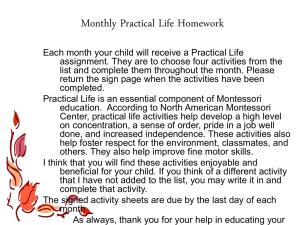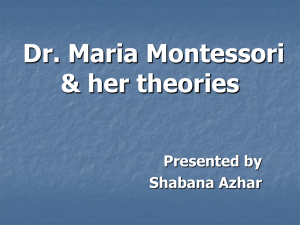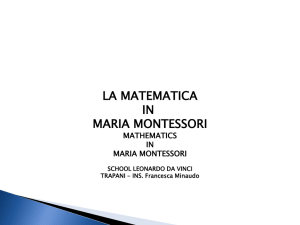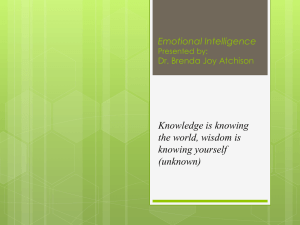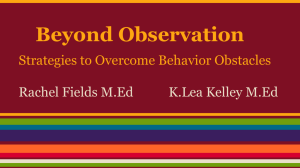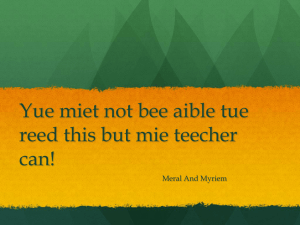PowerPoint - Montessori Congress 2013
advertisement
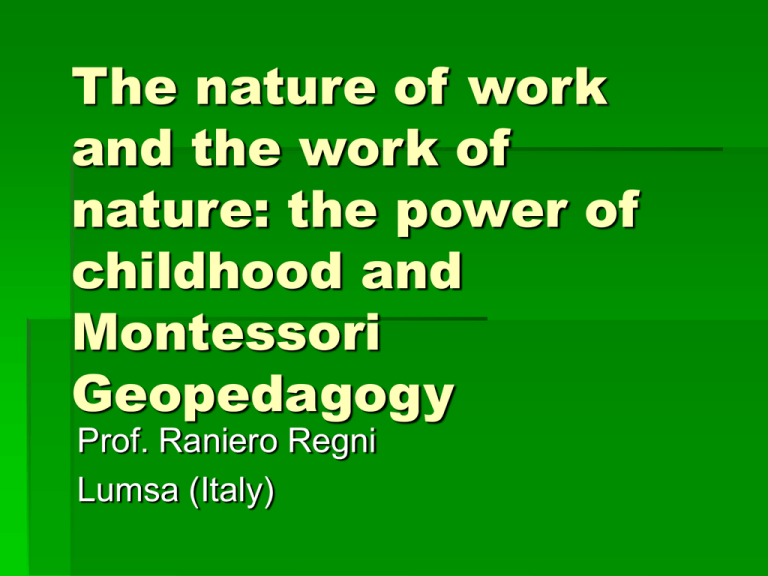
The nature of work and the work of nature: the power of childhood and Montessori Geopedagogy Prof. Raniero Regni Lumsa (Italy) “Man builds himself by working. Nothing can substitute the lack of work: neither welfare nor affection” (The Secret of Childhood, p. 262) “A broken soul becomes whole…No teacher could do this. This is the work of nature when children are given possibilities for work in the right environment”, The 1946 London Lectures, p.156” “The principal enemy of civilization is generally civilization itself” (A. Camus) The work of Nature (Evolution) has produced the man Nature has produced the hand as an organ of the intelligence and as a visible part of the brain. “Today we have nearly lost the use of our hands. We use our hands for writing…The hand is divorced from the drama of thought” (The 1946 London Lectures, p. 152). The child’s hand A little child thinks with his hands. There is a tie between hand and mind, as the result of the evolutionary dialogue between hand and brain Taking and leaving The Child craftsman, the child worker The child's hand is an expression of the instinct of work: the child feels the need to work . the child worker who can combine soul, mind, eye and hand. Play-work We should talk of play-work: the child combines the spontaneity and freedom of the game with the seriousness and the concentrated effort of the work The Action absorbs the whole attention and Energy of a child ...The use of the hands brings a profound attention, The 1946 London Lectures, p. 153 The differences between adult’s and child’s work The child’s work is free like play but serious like work. Work as a pain VS Work as a joy Conscious VS unconscious Exterior purposes VS Interior purposes Minimun-max law VS maximum effort The differences between adult’s and child’s work Work consumes the adult VS work regenerates the child Fast VS slow When it achieves its target it stops VS When it achieves its target it starts again The love of the environment The child’s work doesn’t aim at a welfare or a comfort, but at something deeper, invisible which is the fruit of a mysterious love, because when you love, you can see things that nobody has seen or can see. The love of the environment, when it is diverted and broken, becomes possession desire. The instinct of the unsatisfied work can be transformed into the idea that not working is a privilege. The work instinct All this is a revelation of energies that come from faraway and have a transcendent aim. The adult work is a collective, organized, social one; the little child’s work is often an individual activity. If the adults in their work are fast, in order to save time, because time is money, the child is slow and only if we respect his being slow, the child will subsequently become fast. The man’s work (agricultural and industrial revolution) produced the Super-Nature “The environment is part of life and life cannot exist without the environment” (London Lectures, p. 224) Human work should have a different aim from the one which is generally attributed to human affairs. If also plants, animals, and other living beings normally accomplish tasks and have missions other than the simple survival, how can human work be different? On one hand its aim is the conservation of the cosmos, on the other hand it is the construction of a Super-Nature. The artificial and technological Super-Nature may destroy Nature. In the adult society instead, they seem to diverge; the work seems to separate man from Nature and man from himself and it becomes hideous work All the other organisms already do it, how can the man be the only element disturbing the universe? The work of Nature and the work of the Child converge The child with is play-work teaches us that work, can also be a vocation, an attractive work can exist even in the adult world. Every vocation is the expression of human beings’ love towards life. The child’s work has the task of harmonizing the work of Nature with the human work The child’s work has the task of harmonizing the work of Nature with the human work, of finding again a work capable of producing life, of improving nature, of collaborating with the creation, a cosmic mission assigned to a better humanity, descendent of a better childhood The normalized child The normalized child, the child who can find an environment and some materials specially prepared for him, will become calm, serene and concentrate. He will be born again he will be a happy child. The work of nature “A broken soul becomes whole…These children became ‘master of themselves’. They seemed to be newborn personalities. They lost their defects and became happy and calm; they were completely transformed. No teacher could do this. This is the work of nature when children are given possibilities for work in the right environment”, (London Lectures, p.156) Collaborating with Nature means collaborating with the Child’s nature Teachers should help the natural teachers, the great work of Nature. The Child is the New Man, no more victim of the events. As everything is connected, we must adopt a new way of thinking. We need to develop an eco-friendly intelligence, ecological intelligence (D. Goleman), capable of unifying the naturalistic intelligence with the social intelligence of H. Gardner. Cosmic Mission and Education at the time of Globalization What can we say about the world society and the globalization? When Einstein, flew away from Europe threatened by Nazism and arrived in the United States, he had to fill out a form at the immigration office; he wrote, under the word "race", "human being". The same Einstein’s perspective was expressed by Maria Montessori when she returned to England after the Second World War, after her stay in India. When someone asked her what nationality she was she answered: "my country is a star that turns around the sun and it is called Earth." The children and their education have also the secret to create the world society. The child is seen as a cosmic agent. Montessori is able to absorb the best intuitions of Humanities and Science. The Child's gesture and human destiny Starting from the Child's gesture Montessori has in her mind the destiny of the world. The world needs cooperation Cosmic education and the civilization of empathy Education and politics, beyond the crisis of the future Cosmic Education as the building of the civilization of empathy (j. Rifkin) Paradoxical relationship which exists between empathy and entropy, empathic expantion and increasing entropy. Increasing complexity, interdependence, awareness > increasing energy consumption > depletion of natural resources. More energy – communication – consciousness= more empathy More energy= more entropy ( usable, available > not available, order > disorder) Will empathy or entropy win in the end? The biophilia the love for everything which is alive, is innate in human beings according to E. Wilson; they try to establish relations with the rest of living world “Consilience” is making the philosophical idealism converge with the religious universalism and the scientific rationality; it is making the scientific field and the humanities meet; it is making the people who believe that the life was aroused in an instant by the divine gesture converge with the ones who think that life on the earth is simply fruit of the evolution. Montessori helps us to look forward “Freedom never exists where it is fought to suffocate something, but only where it is left an infinite expansion of life… Equally, trough the conquests of conscience and thought liberty, we are moving towards a great religious triumph… Also the Spirit has its nature - and it is the spiritual life that dominates the existence at any age... The secret of the whole Nature is in the child’s soul… It is a pedagogy inspired by the high concept of Emanuel Kant: the perfect art returns to nature (Il Metodo della pedagogia scientifica, pp.277, 278, 280)
